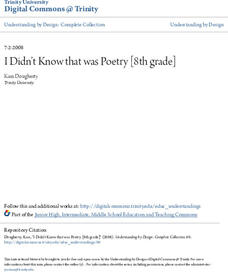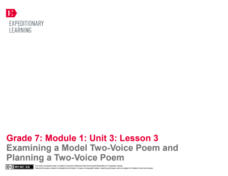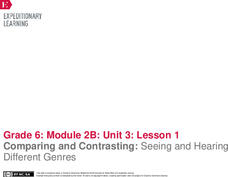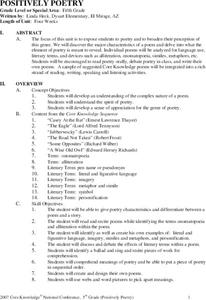Trinity University
I Didn’t Know that was Poetry
Poetry or prose? That is the question facing middle schoolers as they begin a month-long poetry unit by examining the characteristics that differentiate poetry and prose writing. Pupils learn about poetic devices and different types of...
National Center for Families Learning
The Summer Fun Summer Learning Poetry Unit
Focus on poetry this summer to enhance those comprehension, fluency, and language skills with a set of resources intended to explore different types of poetry, specifically lyric poetry. The daily activities contain differentiation ideas...
EngageNY
Examining a Model Two-Voice Poem and Planning a Two-Voice Poem
Successful poetry writing requires three P's: planning, preparation, and practice. Pupils read a model two-voice poem and discuss how the author uses evidence to develop the theme. With a partner, scholars use a rubric to analyze the...
EngageNY
Mid-Unit Assessment: Small Group Discussion: How Do Modern Poems Portray Modern Adversities?
How is a poem similar to and different from a news article? Pupils use a graphic organizer to compare and contrast the two genres. Also, as part of a mid-unit assessment, scholars participate in small-group discussions based on poetry...
EngageNY
Writing the Final Narrative: Monologue or Concrete Poem
Get inspired to help those creative juices flow. Using the resource, scholars write their final, best version of their narrative monologues or concrete poems. Next, they prepare for a performance task by watching and discussing a video...
K12 Reader
Adding Alliteration to Poetry
Alliteration can make the language of a poem flow. Add adjectives to several blanks in two poems to form alliterative phrases.
Nasher Museum of Art at Duke University
Are You My Mother? An Opinion Writing Unit
During a five-day lesson, scholars analyze written and visual art—primarily the poem, Mother to Son by Langston Hughes— identify facts, and write opinions. Learners read the poem several times, discuss, write, compare and contrast, and...
National Endowment for the Humanities
Walt Whitman to Langston Hughes: Poems for a Democracy
Explore the idea of democratic poetry. Upper graders read Walt Whitman, examining daguerreotypes, and compare Whitman to Langston Hughes. They describe aspects of Whitman's I Hear America Singing to Langston Hughes' Let America Be...
EngageNY
Analyzing Character: Who is Lyddie?
Character analysis can help readers feel more connected to a literary text. Scholars explore the topic by writing an acrostic poem about the main character from Katherine Paterson's novel, Lyddie. Then, pupils watch a short video to help...
EngageNY
Comparing and Contrasting: Seeing and Hearing Different Genres
Let's compare and contrast! Scholars use a Venn diagram to compare and contrast the experience of reading a poem and listening to its audio version. Next, they complete graphic organizers, comparing two different genres: a poem and a...
EngageNY
Analyzing the Significance of the Novel’s Title: Connecting the Universal Refugee Experience to Inside Out and Back Again, Part 3
What does it mean to mourn something? Scholars continue reading paragraph four from "Refugee and Immigrant Children: A Comparison" to better understand the mourning process for refugee children. Working with a partner, pupils then read...
National Park Service
A Natural Resource Called Peace
Get your pupils outside and teach them about peace at the same time! Scholars create a list describing peace, hike outside, add to that list, and later create poems. The exercises support differentiation for your individual classes as...
Intel
Insects: The Good, The Bad, The Ugly
What would the world be like with no insects? Ponder this question using a research-based STEM unit that encourages scholars to investigate insects from both a beneficial and hazardous perspective. They learn about insect behaviors,...
Curated OER
Poetry Writing
Students read various examples of poetry and create a poetry portfolio. In this poetry writing lesson plan, students work at their own pace to complete a poetry portfolio with examples of the different poetic forms demonstrated. ...
Trinity University Digital Commons
Romanticism: Past and Present
With its focus on nature, individualism, imagination, and rejection of traditional authority, Romanticism has great appeal to young high schoolers. After examining classic paintings and poems as well as current works, class members...
Curated OER
Response to Literature: Anecdotal and Saga Memoir Poems
Students differentiate between anecdotal and saga memoir poems. For this response to literature lesson students analyze poems written by others then analyze incidents from their own lives to determine whether they meet the criteria for...
Curated OER
Civil War
Historical poetry is lyrical in form and rich with content. After examining the differences between the Northern and Southern states before and during the U.S. Civil War, learners complete a Venn diagram and create an illustration of the...
E Reading Worksheets
Poetic Devices Finder
Track the poetic elements in any text with a guided reading worksheet. Kids note examples of consonance, alliteration, onomatopoeia, repetition, rhyme, and rhythm when reading a poem or story, and provide a short explanation as to why...
Scholastic
Ready to Research Owls
Researching facts about owls can be a hoot for your class. Let them wisely collaborate on this writing project. The resource is the second part of three parts. It is best to use all three lessons in order.
EngageNY
Developing Reading Fluency: Selecting a Text and Practicing Reading Aloud
Young readers continue to strengthen their fluency skills with a text of their choosing. The teacher first engages the class with an audio recording or read-aloud of a short poem, modeling for children how to read fluently. Next it's...
EngageNY
Developing Reading Fluency: Criteria for Reading Aloud
Third graders develop their reading superpowers in a lesson plan on fluency. After first listening to an audio recording or teacher read aloud, the class works together identifying criteria for fluent reading, focusing on phrasing, rate,...
Curated OER
Signing a Poem
Students interpret poetry though movement. In this poetry lesson plan students take a poem they've previously read and discussed in class and work in pairs to develop gestures for each line.
Curated OER
Positively Poetry
Students complete a unit on poetry. In this poetry lesson, students complete 19 lessons that focus on reading and writing poetry as well as learning about literary elements and sound devices. Students read poetry orally, debate poetry in...
University of California
The Civil War: The Road to War
The United States Civil War resulted in the highest mortality rate for Americans since the nation's inception. Delve deeper into the causes for the drastic separation of states with a history lesson plan that features analysis charts,...

























